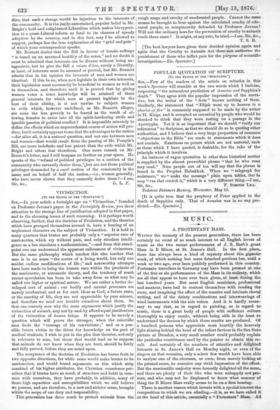POPULAR QUOTATION OF SCRIPTURE.
[TO THE EDITOR OF THE "SPECTATOR"]
SIR,—Few of the readers of the article on miracles in this week's Spectator will stumble at the two words which I italicise, respecting "the miraculous prediction of Ananias and Sapphire's- death." They agree with the popular impression of the narra- tive, but the writer of the " Acts " knows nothing of them. Similarly, the statement that "Elijah went up to heaven in a chariot offire" is commonly supposed to be made by the writer inTI. Kings, and is accepted as canonical by people who would be- shocked to think that they were resting on a passage in the- Apocrypha. Yet it is as important that we should "verify our- references" to Scripture, as that we should do so in quoting other authorities, and I believe that a very large proportion of common "objections to the Bible" are made to statements which it does. not contain. Exactness on points which are not material, such as those which I have quoted, is desirable, for the sake of the principle which it involves.
An instance of vague quotation in other than historical matter is supplied by the almost proverbial phrase "that he who runs may read." Nine people out of ten will say that the phrase is found in the Prophet Habakkuk. When we "telegraph for assistance," we "make the message" plain upon tables, that he may "run that readeth it," which is a very different thing.—I am, Sir, &c., F. SIMCOX LEA. Tedstone Delamere Rectory, Worcester, May 10.
[It is quite true that the prophecy of Peter applied to the death of Sapphire only. That of Ananias was in no way pre- dicted.—En. Spectator.]


































 Previous page
Previous page